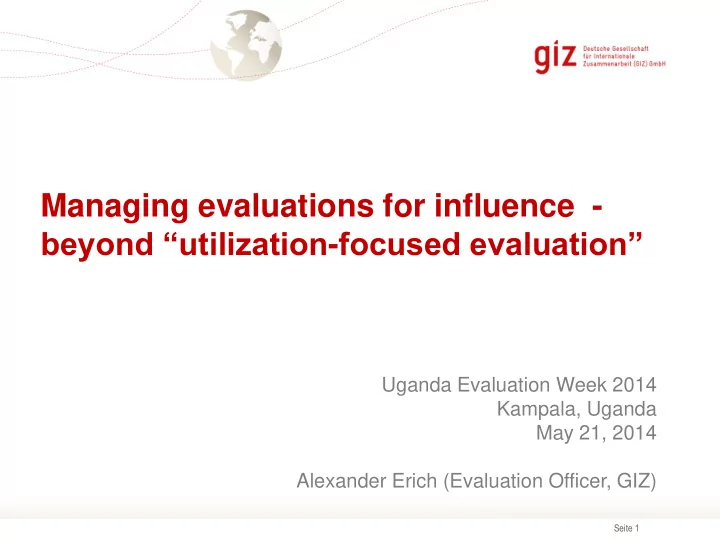

Managing evaluations for influence - beyond “utilization - focused evaluation” Uganda Evaluation Week 2014 Kampala, Uganda May 21, 2014 Alexander Erich (Evaluation Officer, GIZ) Seite 1
A. Introductory remarks • New M+E Policy of GIZ (January 2014) offers huge opportunity for innovation , since ‚ nuts and bolts ‘ of M+E instruments are still work in progress • Key question: How can evaluations be managed to maximise their potential for influencing policy, programming and implementation? Seite 2
A. Introductory remarks (2) • Management… • … is what managers do! • … comprises planning, organizing, staffing, leading and controlling an organization or initiative (Wikipedia) • … is the transformation of resources into utility (F. Malik) Seite 3
A. Introductory remarks (3) • Evaluation management … • … encompasses several functions , including planning, organizing, staffing, coordinating and controlling of evaluations • … is directed at achieving the objectives of the evaluation • … is thus more than procurement and administration • … is largely undertheorised in the literature Seite 4
B. Utilisation and influence • First things first - utilisation of evaluation findings is the precondition for evaluations to be influential • The starting point for „Utilization -Focused Evaluation “ (UFE) (M . Patton) are thus identifying „intended uses by intended users“ • But identifying users and uses is not a „magic bullet“ - evaluation management must be geared towards and actively take steps to promote use of evaluations Seite 5
B. Utilisation and influence (2) • UFE is based on a linear logic regarding the formulation of evaluation objectives • UFE does not sufficiently take into account complexity and embeddedness of evaluations in political, institutional and cultural contexts • Instead, a systemic understanding of the role evaluations can play in bringing about change is required ( theory of change for evaluations ) • From “planning intended use” to “ enhancing potential influence ” Seite 6
B. Utilisation and influence (3) • Research indicates that high quality of evaluative evidence is not enough to stimulate use (Johnson et al 2009, Innvaer et al 2002) • Stakeholder involvement in evaluation process is key. • But additional considerations are needed (e.g. good timing, effective communication, political climate) Seite 7
C. Towards influential evaluation management • Analyse context factors , including • …stakeholder interests • …politics • …institutional structures • … organisational (evaluation) culture • …and others? Seite 8
C. Towards influential evaluation management (2) • Managerial decisions in regard to • …stakeholder participation • …governance structure • …role of evaluators • …timing • …budget • …and others! Seite 9
4. Towards influential evaluation management (3) • Approaches and tools , such as • … various evaluation designs and methodologies • … advisory groups • … dialogue and communication formats • … and many others more! Seite 10
C. Towards influential evaluation management (4) • stakeholder interests • political processes Context factors • institutional processes • organisational culture • governance structure • stakeholder participation Managerial decisions • role of evaluators • timing and budget • design and methodology • advisory groups Approaches and tools • communication formats Seite 11
Vielen Dank für Ihre Aufmerksamkeit! Thank you for your attention! Seite 12
Recommend
More recommend